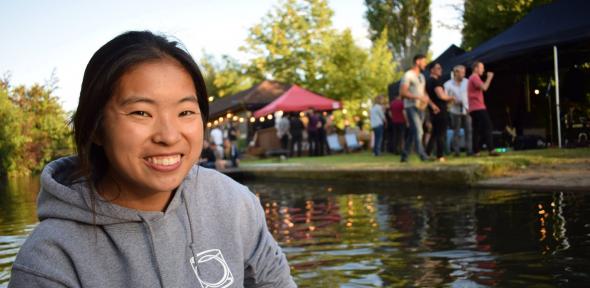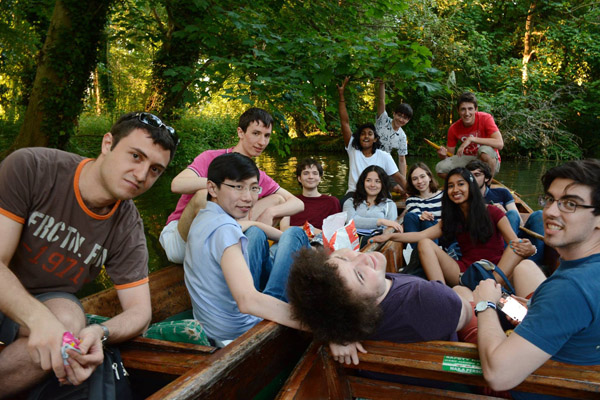
The Archimedeans is a mathematics society run by students of the University of Cambridge for their peers. We talk to the outgoing President, Yanni Du, about what the society does and why it is worth joining — even if your degree subject isn't mathematics.
The Archimedeans are a society for everyone — whether it's people who want to learn a bit more maths, or people who want to socialise with other people who also enjoy maths. Yanni Du
"The point of the Archimedeans is simply to promote the enjoyment of maths," says Du. "The society is open to all: you don’t have to be studying maths, you just have to be interested in maths. [It's] a society for everyone — whether it's people who want to learn a bit more maths, or people who want to socialise with other people who also enjoy maths."
The Archimedeans' main mission is to organise events that inspire, entertain and have fun with a subject that, if it's the main topic of your degree, can be challenging. The society was founded in 1935 and has been attracting a good part of the undergraduate intake each year ever since: 130 students signed up this year and the current total is over 2000 members. The option to become a member for life means that many alumni keep in touch with their student years through the society, if not by attending local events, then through the society's well-known annual journal Eureka.
Maths, games and pizza
The most visible activity at the CMS, not least due to the great posters designed by the Archimedeans' outgoing publicity officer Zheneng Xie, is the regular Friday afternoon talk. Speakers come from all over the UK and abroad, and frequently include impressive names: Fields medalists Michael Atiyah, Wendelin Werner and Alain Conne have all addressed the Archimedean audience. Suitably serious topics, such as quantum gravity and algebraic geometry, are covered, but less intimidating areas such as the maths of juggling (involving group theory) or whether the perfect cocktail should be shaken or stirred (fluid dynamics), also appear on the menu. Most importantly, the talks are aimed at a general audience and aren't connected to the degree syllabus in any way.
"We also do social events," says Du. "Every term we have one or two pizza and board games nights. These usually happen after specific deadlines [for projects], so it's really relaxing to spend a night eating pizza and playing games after having been up working quite late."
A maths themed pub quiz (held at that well-known Cambridge pub; the CMS) is another regular occurrence, and so are Problems Drives which give participants a chance to try out their mathematical skills. "Last term we had an integration contest," says Du. "It was incredible to see how many people turned up on a Saturday afternoon to come and do integration problems. It was a lot of fun." Apart from that there are also punting trips, BBQs, and an annual dinner that bring everyone together.
The events are a great opportunity particularly for new mathematics students to relax and socialise with their peers, and for maths enthusiasts to spend time with like-minded people. The membership for life option means that older generations also mingle with the audience. "We have regulars that have been coming to our talks for twenty years or more," says Du.

The Archimedeans on a punting trip.
Eureka!
Even those alumni who no longer reside near their alma mater can keep in touch with the Archimedeans: its journal Eureka has been published 64 times since 1939 and is mailed out every year to addresses all over the world. The journal includes articles by members and other mathematicians, as well as problems, puzzles, art work and book reviews. Paul Dirac, Paul Erdos, John Conway and Stephen Hawking are just some famous names on the list of authors that have contributed to Eureka. One famous Eureka article was written in 1944 by Freeman Dyson. In it Dyson examined the partition congruences that had earlier been defined by the legendary Srinivasa Ramanujan, another famous personality in the history of Cambridge mathematics.
Eureka is distributed free of charge to undergraduate members, but students from elsewhere in the UK, as well as alumni and libraries can also subscribe. If you are interested in subscribing, you can find out more here.
Keeping the spark alive
The Archimedeans is a society for students, but the Faculty as a whole benefits too. "[For many students] university maths is quite a step up from school maths," says Du. "Although it's really interesting, at times it can be tough to keep on top of your work. [The Archimedeans are] about keeping the maths spark alive. It could just be about relaxing and enjoying company and enjoying pizza, or it could be about seeing how the maths you learn is applied in the real world. It's not just about what happens in lectures."
Du is in the final year of her mathematics degree at Cambridge. "I really enjoyed the maths," she said. "It was a step up, but as long as you enjoy the subject that's the only thing that really matters." She already has a job lined up with a quantitative trading company in Dublin. Apart from the mathematics she has learnt in her degree, skills she gained being involved with the Archimedeans are bound to stand her in good stead.
You can find out more about the Archimedeans and how to join on their website.
